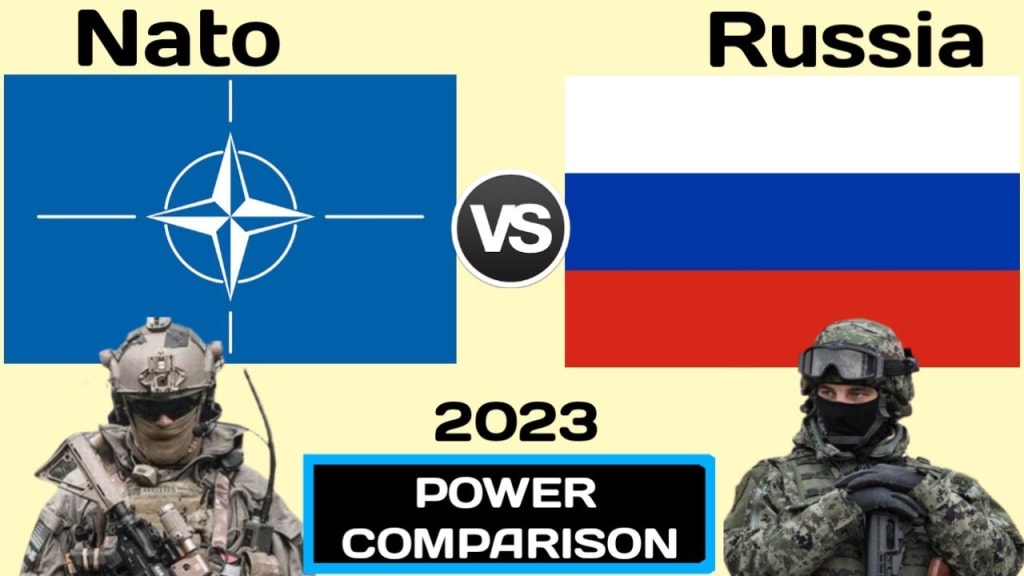Content warning
This story may contain sensitive material or discuss topics that some readers may find distressing. Reader discretion is advised. The views and opinions expressed in this story are those of the author and do not necessarily reflect the official policy or position of Vocal.
USA and NATO vs RUSSIA and CHINA - Who Would Win? - Military / Army Comparison
Who really would win?

As of my last update in September 2021, attempting to predict the outcome of a hypothetical military conflict between specific nations or alliances, such as USA and NATO versus Russia and China, is highly speculative and would depend on numerous variables and scenarios.
It's important to note that military strength is not solely determined by the size of the armed forces, but also by various other factors, such as technological capabilities, training, strategic alliances, economic resilience, geographical factors, and political will.
As of 2021, the USA and NATO possessed substantial military capabilities and advanced technology. The United States, in particular, has one of the most potent and technologically advanced military forces in the world. NATO, as a collective defense alliance, also represents a significant military force comprising various highly capable nations.
Russia and China, on the other hand, possess large and well-equipped military forces with significant technological advancements of their own. Both countries have been investing heavily in modernizing their militaries and increasing their capabilities.
It's important to stress that any military conflict between major powers like these would have devastating consequences and would likely escalate rapidly, making it a scenario to be avoided at all costs.
It's essential for nations to prioritize diplomacy, dialogue, and peaceful resolution of conflicts to maintain stability and prevent armed confrontations that could have catastrophic consequences. International cooperation, communication, and diplomatic efforts are crucial for fostering global peace and stability.
let's delve further into some additional factors that could influence the outcome of a hypothetical conflict between the USA and NATO versus Russia and China:
Alliances and Coalition Building: In such a scenario, both sides would likely seek to form alliances and coalitions to bolster their military capabilities. The USA and NATO have historically relied on strong alliances, while Russia and China might also seek to establish partnerships with other countries to strengthen their position.
Geography and Terrain: The geography and terrain of the conflict zones could play a significant role. Some regions might be more advantageous for certain forces, while others could present challenges in terms of logistics and maneuverability.
Military Doctrine and Strategy: Each country has its own military doctrine and strategy, which would influence how they approach the conflict. The USA and NATO typically emphasize joint operations, technological superiority, and power projection, while Russia and China often emphasize asymmetrical warfare and defensive strategies.
Economic Factors: The economic strength and capacity to sustain a prolonged conflict are crucial factors. The USA and NATO have robust economies and extensive defense budgets, allowing for continued military operations. Russia and China's economies are also significant, but they might face challenges in prolonged conflicts due to potential resource constraints.
Cyberwarfare and Information Operations: Modern conflicts are not limited to conventional warfare. Cyberwarfare and information operations could have a significant impact on communication, intelligence gathering, and public perception, potentially shifting the balance of power.
Nuclear Deterrence: The presence of nuclear weapons on both sides could deter all-out war and influence the conduct of the conflict. The use of nuclear weapons would have catastrophic consequences, leading to the need for cautious decision-making.
Morale and Homefront Support: Public morale and homefront support are vital for sustaining military operations. Each country's ability to maintain support and morale among its population during the conflict could affect its overall performance.
Intelligence and Surveillance: Effective intelligence gathering and surveillance capabilities can provide a strategic advantage by enabling preemptive actions and countering enemy moves.
Asymmetric Capabilities: Both sides might possess unconventional or asymmetric capabilities, such as guerrilla tactics, drone warfare, or advanced missile systems, which could potentially challenge traditional military approaches.
International Reactions: The international community's response to the conflict could also play a role, with some countries possibly intervening or applying diplomatic pressure to seek a peaceful resolution.
It is important to reiterate that a military conflict between major powers would be devastating and should be avoided through diplomatic means. The global community should prioritize dialogue, cooperation, and conflict resolution mechanisms to prevent such a scenario from ever unfolding.
About the Creator
Ndikubwimana Potien
Hello! I'm Potien, a passionate guy in applied statistics. My journey in the world of statistics began during my academic years, where I delved into the fascinating world of data analysis, modeling, and predictive analytics.
Enjoyed the story? Support the Creator.
Subscribe for free to receive all their stories in your feed. You could also pledge your support or give them a one-off tip, letting them know you appreciate their work.





Comments
There are no comments for this story
Be the first to respond and start the conversation.